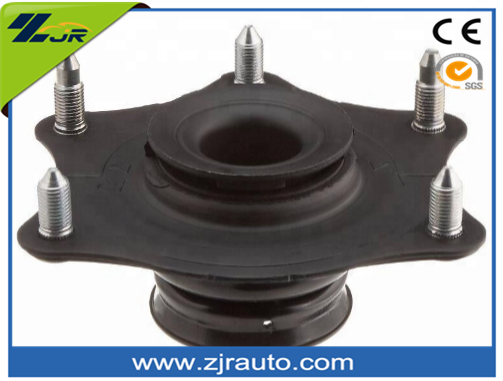Views: 1 Author: Site Editor Publish Time: 2025-06-30 Origin: Site








A vehicle’s suspension system plays a crucial role in providing a smooth and comfortable driving experience, and one of its essential components is the strut mount. If your vehicle feels less stable, makes unusual noises, or provides a bumpier ride than usual, it might be time to inspect or replace the strut mount. This article explores what a strut mount is, its function in your vehicle, and provides a step-by-step guide on how to replace it.
A strut mount is a critical part of a vehicle's suspension system. It connects the strut assembly (the shock absorber and suspension coil spring) to the vehicle’s chassis. Essentially, it serves as a bridge between the strut and the vehicle body while also acting as a cushion that absorbs vibrations and road noise.


Attachment – The strut mount securely attaches the strut to the vehicle's chassis while allowing for minimal movement during operation. Shock Absorption – It helps minimize vibrations, making for a smoother and quieter ride. Steering Enhancement – For front suspensions, strut mounts can include a bearing that supports the steering system, allowing the wheels to turn more easily.
Imagine driving along a bumpy road; without a properly functioning strut and strut mount, every imperfection in the road surface would be transmitted directly to the vehicle cabin, making the ride uncomfortable and unsafe. Strut mounts are designed to ensure these vibrations and shocks don’t compromise your driving experience or vehicle stability.
It’s important to recognize when your strut mounts need attention. Here are some commonly observed symptoms:
Increased vibrations in the vehicle cabin Clunking, popping, or knocking noises when hitting bumps Uneven tire wear due to misaligned suspension geometry Poor steering response or increased difficulty in turning the wheel
When these issues arise, proactive replacement of your strut mount is key to maintaining your vehicle's performance and safety.
Replacing a strut mount might seem daunting, but with the right tools, safety precautions, and preparation, you can handle the job efficiently. Here's a step-by-step guide.
Before you start, make sure you have the following tools on hand. These will also be summarized in a table below for quick reference:
Jack and jack stands Wrenches (including a socket wrench set) Spring compressor Torque wrench Screwdrivers Safety gloves and goggles New strut mount


Park the vehicle on a flat, level surface and engage the parking brake. Loosen the lug nuts on the wheels where the struts are being replaced but do not remove them. Use a jack to lift the vehicle and secure it with jack stands. Remove the wheels for greater access.
Locate the strut assembly. Start by removing the bolts that secure the strut to the suspension system. Detach the brake line and other components attached to the strut (e.g., ABS sensor if applicable) to avoid damaging them. Loosen the top strut mount bolts under the vehicle hood, but do not remove them completely yet. Carefully remove the entire strut assembly from the vehicle.
Attach the spring compressor to the coil spring. This step is critical as the coil spring is under extreme tension and can be dangerous if mishandled. Compress the spring until it is loose enough to safely separate from the strut.
Remove the old strut mount from the top of the strut assembly. Inspect the strut for any damage or wear. If needed, consider replacing the strut along with the mount. Install the new strut mount onto the assembly, ensuring it is seated correctly.
Reinstall the coil spring onto the strut assembly using the compressed spring. Carefully release the spring compressor once the spring is properly positioned. Reinstall the strut assembly into the vehicle, starting with the top mount bolts and then securing the lower mounting points. Reattach the brake lines and any other detached components.
Reinstall the wheels and hand-tighten the lug nuts. Lower the vehicle from the jack stands and torque the lug nuts to the manufacturer’s specification. Take the vehicle for a test drive to ensure everything is functioning as expected.
By following these steps, you can restore your suspension system’s efficiency with a new, fully functional strut mount.
Tool | Purpose |
|---|---|
Jack and Jack Stands | Lifts and stabilizes the vehicle during the process |
Wrenches | Helps remove and tighten bolts |
Spring Compressor | Compresses the coil spring safely |
Torque Wrench | Ensures accurate tightening of bolts |
Screwdrivers | Assists with loosening smaller components |
Safety Gear | Protects hands and eyes during the process |
A strut mount is a crucial suspension component that connects the strut assembly to the vehicle’s chassis, absorbs shocks, and reduces vibrations. It plays a vital role in ensuring a smooth ride and enhancing steering performance.
Replacing a strut mount involves removing the strut assembly, compressing the spring to safely access the mount, swapping out the old mount for a new one, and then reassembling and reinstalling the strut assembly into the vehicle. Always take proper safety precautions and use the right tools for the job.


Keeping your strut mounts in top condition ensures a safer, quieter, and more comfortable ride. A failing strut mount doesn’t just compromise your driving experience—it can lead to costly repair bills if left unaddressed.
When it’s time to replace your strut mounts, turn to zjr auto for high-quality replacements. With a commitment to reliability and performance, zjr auto offers parts designed to meet or exceed industry standards. Contact zjr auto today to find the best strut mounts for your vehicle.
Email: info@zjrauto.com
Phone: +86 13702583315
Investing in the right parts and staying proactive with maintenance will keep your vehicle running smoothly for years to come. zjr auto is your trusted partner for all your strut mount needs.